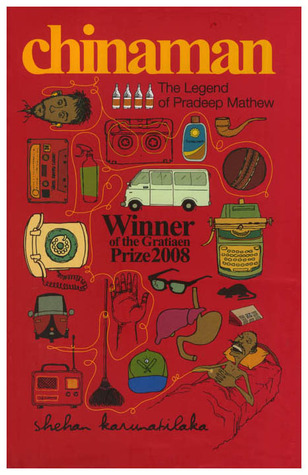
Using cricket as a device to write about Sri Lankan society, Jim Morphy reviews Chinaman by Shehan Karunatilaka.
The use of sport to tell the story of a country is a well-trodden literary path. Don DeLillo, Philip Roth, Joseph O’Neill and Chad Harbach are just a few of the star (and not so star) names to have used the playing field as an entry point for explorations into wider themes and of big ambition. Shehan Karunatilaka adds himself to this list with his startlingly-assured debut novel, Chinaman. For when the Sri Lankan set out to explore the psyche of his homeland, he settled on cricket as the vehicle with which to do it. While, bizarrely, volleyball is the official national game, it is with bat and ball that the island’s people are fixated. And, certainly, cricket is what many outsiders, perhaps ignorantly, first bring to mind when they think of the nation. Like it or not, sport and national identity are indelibly linked.
Retired sportswriter W.G. Karunasena is our dying, grumpy, often-drunken, unreliable narrator. He wants to do something worthwhile with his last years on earth, and, sadly, that is unlikely to involve his wife or son. As only an intelligent fool would do, he decides that ‘what the world needs most is a halfway decent documentary on Sri Lankan cricket’. Chinaman chronicles the final, and most important, part of the writer’s ambition: telling the story of, and hopefully tracking down, the spin bowler Pradeep S. Mathew, who W.G. thinks is ‘the greatest player to walk the earth’.
 And this is where things get interesting. For Karunatilaka’s novel presents a magnificent blurring of fact and fiction. The book delves deeply into the history of Sri Lankan cricket, referencing famous games and famous players. Mathew’s legacy of only four Test Matches, prejudice, rebellion, and disappearance fits so snugly into this folklore that even cricket aficionados will be dashing off to crikipedia to see what is real and what is not.
And this is where things get interesting. For Karunatilaka’s novel presents a magnificent blurring of fact and fiction. The book delves deeply into the history of Sri Lankan cricket, referencing famous games and famous players. Mathew’s legacy of only four Test Matches, prejudice, rebellion, and disappearance fits so snugly into this folklore that even cricket aficionados will be dashing off to crikipedia to see what is real and what is not.
We are told early on that ‘If you’ve never seen a cricket match…then this is the book for you’. And, without doubt, there is plenty enough here to keep even the sport-averse happy. Karunatilaka has written a literate and highly-readable romp of a story. W.G. (yes, indeed, cricket fans) Karunasena proves to be a wonderful creation, and his discursive ramblings just about hold the novel together.
This long book is told in five chapters, starting with the first innings and ending with the last over. But these sections are then broken down into parts sometimes of no more than a paragraph or two. Or even just a diagram with explanation. This inventive format allows our endearing narrator to go off in all directions. The narrative thrust revolves around Karunasena’s efforts to talk to Mathew’s former team-mates and acquaintances. Karunatilaka uses this as a way of examining the politics and underbelly of Sri Lankan life, as we encounter Government Ministers and gangsters, bookmakers and terrorists. In particular, Karunatilaka is strong when giving a sense of the tensions between the country’s Sinhalese and Tamils. And the author displays a delicate touch in his handling of W.G. Karunasena’s precarious relationships with family members.
But it is to cricket that the book keeps returning. And, certainly, it is sport-freaks that will get the most fun out of this read. The narrator and his friends come across as members of that rare species of inebriated, sport-obsessed know-it-alls that you actually want to listen to.
Cricket fans will lap up the endless stream of references to pub-talk trivia and legend, such as Lillee’s aluminium bat, Lara‘s 375, and Darrell Hair’s calling of Muralitharan for throwing. Other pursuits are thrown in too, for good measure: Yordan Letchkov, Nigel Mansell and Gareth Edwards all get unlikely mentions. These discursions never feel forced or frivolous though, providing, as they do, illuminating entry into the curious (in more ways than one) mind of our host.
After a long, meandering ride, and via a few literary tricks, the book arrives at Karunasena’s son, Garfield (winks all ’round, again), describing what it’s like to face his father’s idol from 22 yards. The sporting and personal stories have come together. All threads finish neatly, leaving the reader warm, satisfied, and with dozens of sporting clips to find on Youtube.
Shehan Karunatilaka has given us a magnificent novel – one as dazzling and original as Mathew’s double-bounce ball that bewitched the world’s top batsmen. This is a book to be enjoyed. The Sri Lankan’s next delivery is already much anticipated.
 And this is where things get interesting. For Karunatilaka’s novel presents a magnificent blurring of fact and fiction. The book delves deeply into the history of Sri Lankan cricket, referencing famous games and famous players. Mathew’s legacy of only four Test Matches, prejudice, rebellion, and disappearance fits so snugly into this folklore that even cricket aficionados will be dashing off to crikipedia to see what is real and what is not.
And this is where things get interesting. For Karunatilaka’s novel presents a magnificent blurring of fact and fiction. The book delves deeply into the history of Sri Lankan cricket, referencing famous games and famous players. Mathew’s legacy of only four Test Matches, prejudice, rebellion, and disappearance fits so snugly into this folklore that even cricket aficionados will be dashing off to crikipedia to see what is real and what is not.










